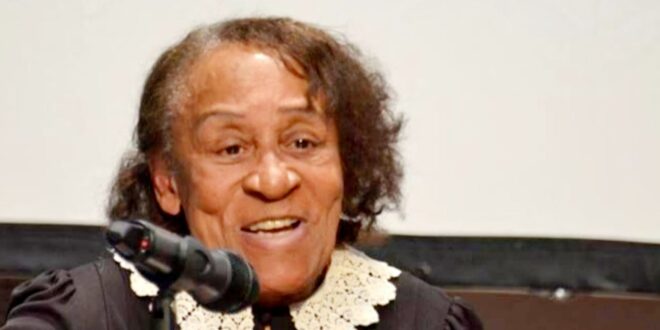Marie Nejar, the last known surviving Afro-German eyewitness to the horrors of Nazi Germany and a revered voice in Afro-German history, has passed away peacefully in Hamburg at the age of 95.
Her death on Sunday (11 May) marks the end of an era — not only as a survivor of a time that tried to erase her identity, but as a cultural figure who rose to prominence in postwar Germany as a singer and actress, and later as a vital chronicler of the Black German experience under Hitler’s regime.
Born in 1930 to a Ghanaian father and German mother, Nejar was only a child when the Nazi regime co-opted her image for propaganda purposes — exploiting her exoticised appearance while denying her full humanity. In the 1950s, she reinvented herself as a popular Schlager singer and film actress under the stage name Leila Negra, gracing screens and stages across Germany.
After numerous hit songs and five film roles, Nejar ended her career in the music and film industry. “She became a Schlager star, once again in a demeaning role,” said the Afro-German journalist and author Hadija Haruna-Oelker in an interview with the NDR. “At the age of 27, she no longer wanted to play that role and decided to pursue a different path.” In 1957, Nejar began training as a nurse. She worked in this profession until her retirement in her hometown of Hamburg.
But it was not until much later in life that Nejar would step into her most enduring role: that of a truth-teller. In 2007, she published her acclaimed autobiography, “Mach nicht so traurige Augen, weil du ein Negerlein bist” (“Don’t Look So Sad Because You’re a Little Negro”), a searing memoir of what it meant to grow up Black in Nazi Germany. The book offered rare insight into the daily humiliations, dangers and contradictions faced by Afro-Germans under the Third Reich.
In the years that followed, she remained an active and cherished member of the Afro-German community — attending events, mentoring younger generations and generously giving her time to interviews and documentaries, always determined to ensure that the voices of Black Germans would not be forgotten in the grand narratives of European history.
“She has always wondered why she is not seen as German, why being Black and German is considered a contradiction. This is representative of her significance in the Black community,” said Haruna-Oelker.
Among those mourning her passing also is Dr Pierrette Herzberger-Fofana, former Member of the European Parliament and a longtime admirer of Nejar. In an emotional tribute, Herzberger-Fofana recalled her final exchanges with Nejar and the unfulfilled promise of a reunion:
“On 11 May 2025, a grand lady of contemporary history passed away,” she wrote. “We are all mourning one of the last Afro-German witnesses of the Second World War. May she rest in peace. She left us quietly – just as she lived – slipping away silently in the night.”
Herzberger-Fofana had been trying for months to find Nejar, determined to reconnect with her after discovering they shared the same birthday.
“I had searched for her address for a long time,” she said. “I contacted numerous nursing homes in Hamburg and reached out to the relevant authorities. Eventually, I found her address, and just three weeks ago, we were able to speak on the phone.”
The reunion had been meant to accompany a private screening of Sankofa, a film summary of a 2015 landmark event that brought together the only three known Afro-German survivors of the Nazi era: Marie Nejar, Gert Schramm and Theodor Michael.
“I had promised her: as soon as I received a copy of the film, I would visit her in Hamburg,” Herzberger-Fofana recalled. “The care home had even offered to organise a screening for the residents. And now Marie has fallen asleep forever – before we could meet again.”
The 2015 event, held in Berlin, was historic in itself — marking the only time that Nejar, Schramm and Michael appeared together, sharing the stage to tell stories that had for too long remained on the margins of German history.
“During our last conversation,” Herzberger-Fofana shared, “Marie said to me: ‘If you organise an event in Berlin, I’ll come. But if you come to Hamburg, even better. And I’ll be happy.’”
Her voice now gone, Marie Nejar leaves behind a legacy carved from courage. As Germany continues to reckon with its complex past and the overlooked stories within it, her life stands as a beacon — a reminder that even in the darkest times, there were voices that survived and sang.
Vivian Asamoah
 THE AFRICAN COURIER. Reporting Africa and its Diaspora! The African Courier is an international magazine published in Germany to report on Africa and the Diaspora African experience. The first issue of the bimonthly magazine appeared on the newsstands on 15 February 1998. The African Courier is a communication forum for European-African political, economic and cultural exchanges, and a voice for Africa in Europe.
THE AFRICAN COURIER. Reporting Africa and its Diaspora! The African Courier is an international magazine published in Germany to report on Africa and the Diaspora African experience. The first issue of the bimonthly magazine appeared on the newsstands on 15 February 1998. The African Courier is a communication forum for European-African political, economic and cultural exchanges, and a voice for Africa in Europe.



































